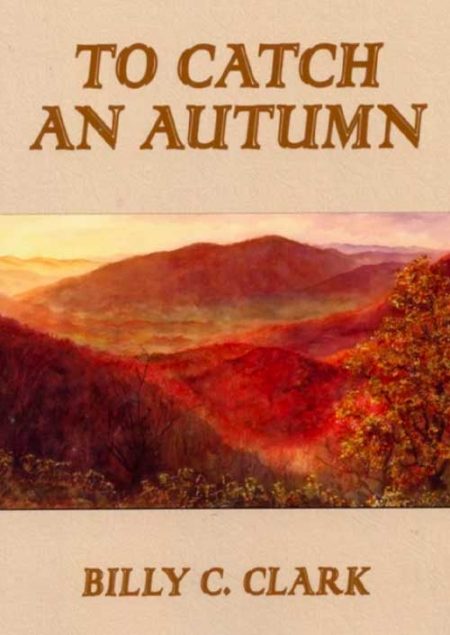-
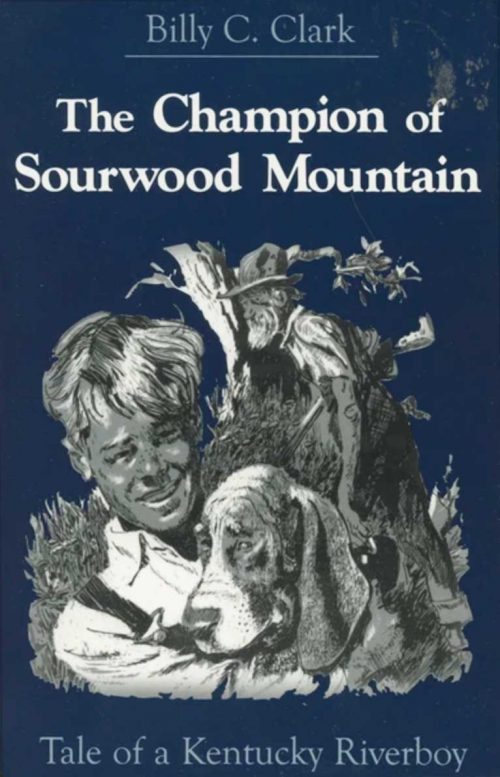 The people, the lore, even the sounds of eastern Kentucky come vividly to life in this affectionate story of a boy and his search dog. In the shadow of Sourwood Mountain, fourteen-year-old Aram Tate is absorbed in the sometimes painful process of growing up. His all-consuming passion is to own a hound dog of his very own, and his efforts to achieve this dream involve him in a series of amusing adventures which broaden his boy's-eye view of the world. Through his friendship with ne'er-do-well Eb ringtom, Aram Learns the ways of men as they never were described in books. Among the other colorful characters who contribute to the boy's education are Lighting and Napoleon, two imcomparably wily gamecocks; Thusla, Eb's great hound whose exploits can only be described as apocryphal; and Rile Feder and his dog, the bluetick Tweedle, who fears neither coon nor fox. SOFTBACK By Billy C. Clark
The people, the lore, even the sounds of eastern Kentucky come vividly to life in this affectionate story of a boy and his search dog. In the shadow of Sourwood Mountain, fourteen-year-old Aram Tate is absorbed in the sometimes painful process of growing up. His all-consuming passion is to own a hound dog of his very own, and his efforts to achieve this dream involve him in a series of amusing adventures which broaden his boy's-eye view of the world. Through his friendship with ne'er-do-well Eb ringtom, Aram Learns the ways of men as they never were described in books. Among the other colorful characters who contribute to the boy's education are Lighting and Napoleon, two imcomparably wily gamecocks; Thusla, Eb's great hound whose exploits can only be described as apocryphal; and Rile Feder and his dog, the bluetick Tweedle, who fears neither coon nor fox. SOFTBACK By Billy C. Clark -
 Authors represented in Appalachian Love Stories include:
Authors represented in Appalachian Love Stories include:- Jesse Stuart
- Ancella R. Bickley
- James M. Gifford
- Jimmy Lowe
- James B. Goode
- Edwina Pendarvis
- Laura Treacy Bentley
- Bruce Radford Richey
- Ina Everman
- Danny Fulks
- Loyal Jones
- Billy C. Clark
- Linda Scott DeRosier
- Christina St. Clair
- Alexandra Combs Hudson
- Kate Larken
- Barbara Smith
- Carol Van Meter
-
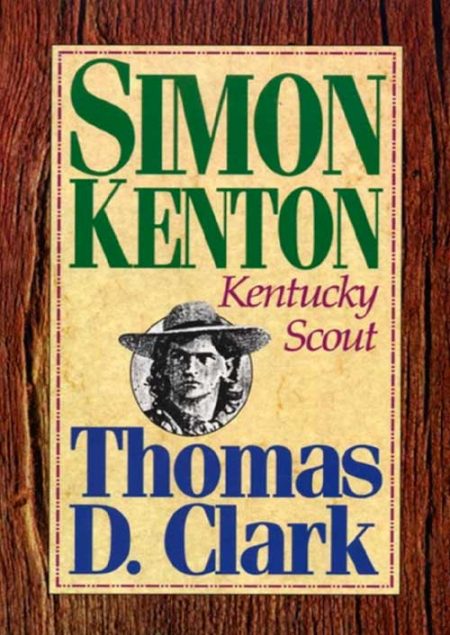 No part of American history is more exciting than the 1770s, when Europeans first settled west of the Appalachian mountains in the land now known as Kentucky. Simon Kenton’s story is synonymous with the story of that era. His life of excitement, adventure, and danger on the frontier made him one of the leading heroes of that time and, eventually a Kentucky legend. By Thomas D. Clark
No part of American history is more exciting than the 1770s, when Europeans first settled west of the Appalachian mountains in the land now known as Kentucky. Simon Kenton’s story is synonymous with the story of that era. His life of excitement, adventure, and danger on the frontier made him one of the leading heroes of that time and, eventually a Kentucky legend. By Thomas D. Clark -
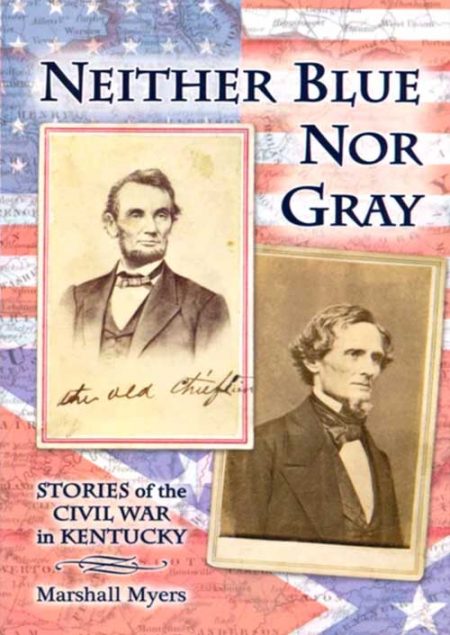 The Civil War affected the daily lives of almost everyone in the Commonwealth of Kentucky, a slave holding state that chose not to secede from the United States. Here are the untold stories of lesser known combatants or the folks back home who suffered in so many ways from the ravages of war. Seventeen chapters range in topics from interviews with former slaves to an examination of Mary Todd Lincoln's family's military involvement in the war. SOFTBACK By Marshall Myers
The Civil War affected the daily lives of almost everyone in the Commonwealth of Kentucky, a slave holding state that chose not to secede from the United States. Here are the untold stories of lesser known combatants or the folks back home who suffered in so many ways from the ravages of war. Seventeen chapters range in topics from interviews with former slaves to an examination of Mary Todd Lincoln's family's military involvement in the war. SOFTBACK By Marshall Myers -
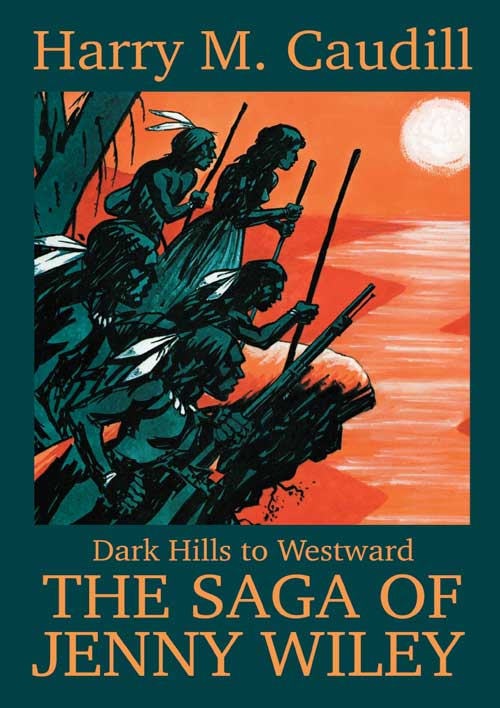 Best known for his nonfiction work "Night Comes to the Cumberlands," Harry M. Caudill also wrote fiction, including “Dark Hills to Westward: The Saga of Jenny Wiley,” first published in 1969 and recently reprinted in a new softback edition by the Jesse Stuart Foundation. When Jenny was an old woman, a preacher had sat down with her and wrote out her captivity story. Although Jenny may have embellished it many times, it is the only first-hand account we have, and it’s the primary source for Caudill’s novel. Briefly, here is her story. Thomas and Jenny Wiley had pioneered land on Walker’s Creek in Bland County, Virginia. On October 1, 1789, while Thomas was away, a small band of Indians, seeking revenge for a recent defeat at the hands of white settlers, attacked the Wiley cabin and killed and scalped Jenny’s three older children and her brother. Jenny, seven months pregnant, was taken captive along with her baby son, Adam. SOFTBACK VERSION By Harry M. Caudill
Best known for his nonfiction work "Night Comes to the Cumberlands," Harry M. Caudill also wrote fiction, including “Dark Hills to Westward: The Saga of Jenny Wiley,” first published in 1969 and recently reprinted in a new softback edition by the Jesse Stuart Foundation. When Jenny was an old woman, a preacher had sat down with her and wrote out her captivity story. Although Jenny may have embellished it many times, it is the only first-hand account we have, and it’s the primary source for Caudill’s novel. Briefly, here is her story. Thomas and Jenny Wiley had pioneered land on Walker’s Creek in Bland County, Virginia. On October 1, 1789, while Thomas was away, a small band of Indians, seeking revenge for a recent defeat at the hands of white settlers, attacked the Wiley cabin and killed and scalped Jenny’s three older children and her brother. Jenny, seven months pregnant, was taken captive along with her baby son, Adam. SOFTBACK VERSION By Harry M. Caudill -
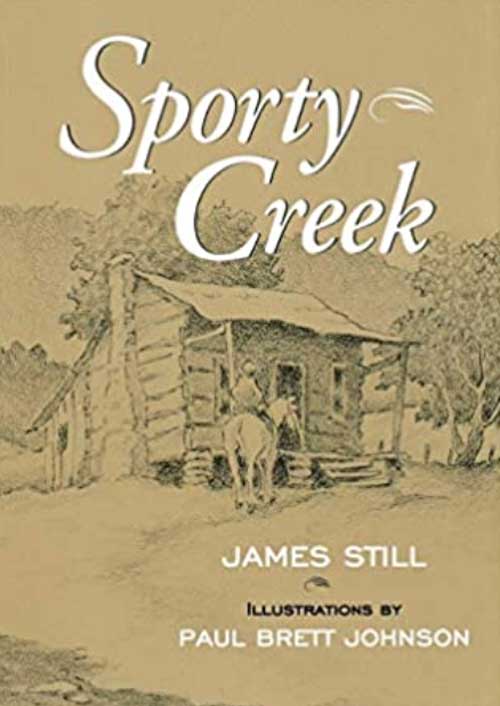 Sporty Creek is a series of short stories set in the Kentucky hills. Narrated by a young boy (a cousin of the narrator of Still's classic novel River of Earth), the book tells the story of his family during the Great Depression. With work in the coal mines sporadic, they move from place to place, trying to earn a living the best they can. The story is told with gentleness and humor. SOFTBACK VERSION By James Still
Sporty Creek is a series of short stories set in the Kentucky hills. Narrated by a young boy (a cousin of the narrator of Still's classic novel River of Earth), the book tells the story of his family during the Great Depression. With work in the coal mines sporadic, they move from place to place, trying to earn a living the best they can. The story is told with gentleness and humor. SOFTBACK VERSION By James Still -
 In his first work of narrative nonfiction, Matthew Pearl, bestselling author of acclaimed novel The Dante Club, explores the little-known true story of the kidnapping of legendary pioneer Daniel Boone’s daughter and the dramatic aftermath that rippled across the nation. On a quiet midsummer day in 1776, weeks after the signing of the Declaration of Independence, thirteen-year-old Jemima Boone and her friends Betsy and Fanny Callaway disappear near the Kentucky settlement of Boonesboro, the echoes of their faraway screams lingering on the air. A Cherokee-Shawnee raiding party has taken the girls as the latest salvo in the blood feud between American Indians and the colonial settlers who have decimated native lands and resources. Hanging Maw, the raiders’ leader, recognizes one of the captives as Jemima Boone, daughter of Kentucky's most influential pioneers, and realizes she could be a valuable pawn in the battle to drive the colonists out of the contested Kentucky territory for good. With Daniel Boone and his posse in pursuit, Hanging Maw devises a plan that could ultimately bring greater peace both to the tribes and the colonists. But after the girls find clever ways to create a trail of clues, the raiding party is ambushed by Boone and the rescuers in a battle with reverberations that nobody could predict. As Matthew Pearl reveals, the exciting story of Jemima Boone’s kidnapping vividly illuminates the early days of America’s westward expansion, and the violent and tragic clashes across cultural lines that ensue. In this enthralling narrative in the tradition of Candice Millard and David Grann, Matthew Pearl unearths a forgotten and dramatic series of events from early in the Revolutionary War that opens a window into America’s transition from colony to nation, with the heavy moral costs incurred amid shocking new alliances and betrayals.. HARDBACK VERSION Matthew Pearl
In his first work of narrative nonfiction, Matthew Pearl, bestselling author of acclaimed novel The Dante Club, explores the little-known true story of the kidnapping of legendary pioneer Daniel Boone’s daughter and the dramatic aftermath that rippled across the nation. On a quiet midsummer day in 1776, weeks after the signing of the Declaration of Independence, thirteen-year-old Jemima Boone and her friends Betsy and Fanny Callaway disappear near the Kentucky settlement of Boonesboro, the echoes of their faraway screams lingering on the air. A Cherokee-Shawnee raiding party has taken the girls as the latest salvo in the blood feud between American Indians and the colonial settlers who have decimated native lands and resources. Hanging Maw, the raiders’ leader, recognizes one of the captives as Jemima Boone, daughter of Kentucky's most influential pioneers, and realizes she could be a valuable pawn in the battle to drive the colonists out of the contested Kentucky territory for good. With Daniel Boone and his posse in pursuit, Hanging Maw devises a plan that could ultimately bring greater peace both to the tribes and the colonists. But after the girls find clever ways to create a trail of clues, the raiding party is ambushed by Boone and the rescuers in a battle with reverberations that nobody could predict. As Matthew Pearl reveals, the exciting story of Jemima Boone’s kidnapping vividly illuminates the early days of America’s westward expansion, and the violent and tragic clashes across cultural lines that ensue. In this enthralling narrative in the tradition of Candice Millard and David Grann, Matthew Pearl unearths a forgotten and dramatic series of events from early in the Revolutionary War that opens a window into America’s transition from colony to nation, with the heavy moral costs incurred amid shocking new alliances and betrayals.. HARDBACK VERSION Matthew Pearl -
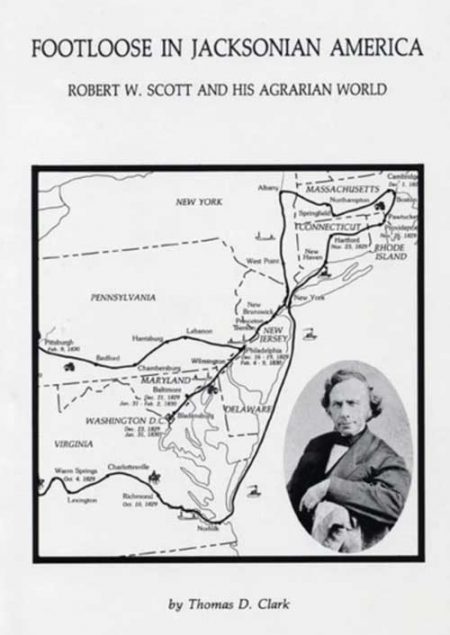 In the fall of 1829, young Robert Wilmot Scott rode away from Frankfort Kentucky on a trip that would take him through nine states. His journal entries about those travels present a vivid picture of Jacksonian America and of the prominent people of that era. Excellent pen portraits of James and Dolly Madison, James Monroe, John Marshall, James Buchanan, Sam Houston, Edward Everett, John C. Calhoun, John Randolph, John Quincy Adams, and others show Scott to be a famous Webster-Hayne debate; he gives a rich account of that discussion and its personalities. By Thomas D. Clark
In the fall of 1829, young Robert Wilmot Scott rode away from Frankfort Kentucky on a trip that would take him through nine states. His journal entries about those travels present a vivid picture of Jacksonian America and of the prominent people of that era. Excellent pen portraits of James and Dolly Madison, James Monroe, John Marshall, James Buchanan, Sam Houston, Edward Everett, John C. Calhoun, John Randolph, John Quincy Adams, and others show Scott to be a famous Webster-Hayne debate; he gives a rich account of that discussion and its personalities. By Thomas D. Clark -
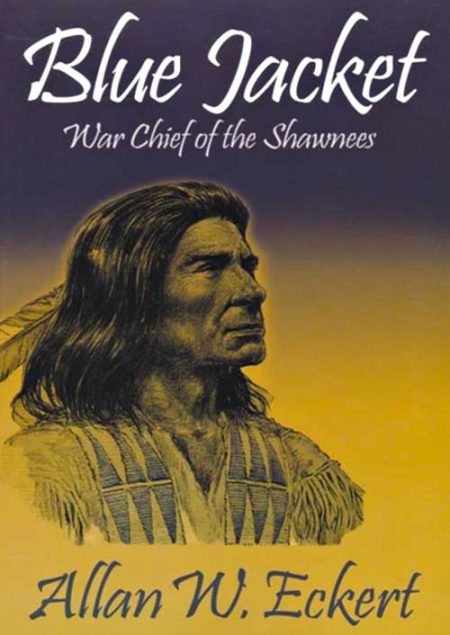 In the year 1771, a white boy named Marmaduke Van Swearingen was captured by the Shawnee Indians in what is now West Virginia, but was then the edge of the American frontier. Impressed with his bravery, he was not killed but instead was taken to Ohio where he was adopted into the tribe and given the name Blue Jacket, from the blue shirt he was wearing at the time of his capture. Eckert has taken all of the known facts of Blue Jacket's life and has woven them into a narrative of compelling interest, with a very different perspective on the way America was settled. The reader will learn what life was really like on the dangerous frontier wilderness that was West Virginia, Kentucky and Ohio before the Revolutionary War. By Allan Eckert
In the year 1771, a white boy named Marmaduke Van Swearingen was captured by the Shawnee Indians in what is now West Virginia, but was then the edge of the American frontier. Impressed with his bravery, he was not killed but instead was taken to Ohio where he was adopted into the tribe and given the name Blue Jacket, from the blue shirt he was wearing at the time of his capture. Eckert has taken all of the known facts of Blue Jacket's life and has woven them into a narrative of compelling interest, with a very different perspective on the way America was settled. The reader will learn what life was really like on the dangerous frontier wilderness that was West Virginia, Kentucky and Ohio before the Revolutionary War. By Allan Eckert -
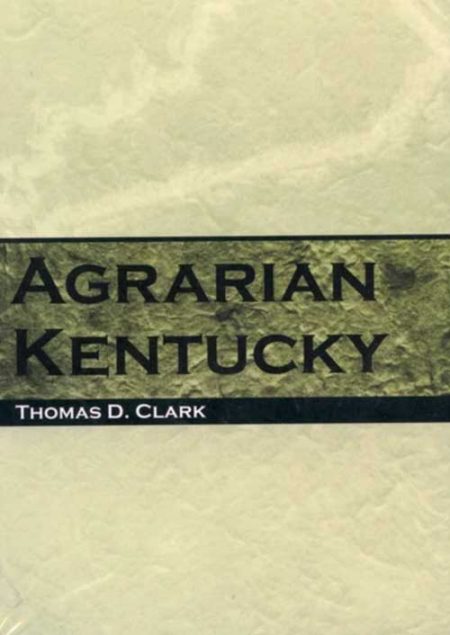 Since the earliest European settlers arrived in the area over two centuries ago, Kentuckians have felt a deep attachment to the land. From subsistence farmers in eastern Kentucky to wealthy horse owners in the central Bluegrass, land was, and continues to be, the state's greatest source of economic growth. It is also a point of nostalgia for a people devoted to tradition, a characteristic that has enriched Kentucky's culture but has proven detrimental to education and development. As timely now as when it was first published, Thomas D. Clark's classic history of agrarianism prepares readers for a new century that promises to bring rapid changes to the land and the people of Kentucky. By Thomas D. Clark
Since the earliest European settlers arrived in the area over two centuries ago, Kentuckians have felt a deep attachment to the land. From subsistence farmers in eastern Kentucky to wealthy horse owners in the central Bluegrass, land was, and continues to be, the state's greatest source of economic growth. It is also a point of nostalgia for a people devoted to tradition, a characteristic that has enriched Kentucky's culture but has proven detrimental to education and development. As timely now as when it was first published, Thomas D. Clark's classic history of agrarianism prepares readers for a new century that promises to bring rapid changes to the land and the people of Kentucky. By Thomas D. Clark -
 Cruelly Murdered: The Murder of Mary Magdalene Pitts and Other Kentucky True Crime Stories: In this follow-up to Murder in Old Kentucky, Keven McQueen presents detailed and thoroughly researched true crime stories from Kentucky history, spanning in time from the state's early history to the Roaring Twenties. The stories include the case of the governor's son who was tried for murder five tmes and eventually pardoned by his father; Edward Hawkins, a murderer on the move with a pronounced taste for bigamy; the 1883 shooting of a promising young Louisville artist; the infamous 1887 murder of Jennie Bowman, a Louisville maid, by two burglars; and the abuse and murder of three-year-old Mary Magdalene Pitts of Greenup County by her father and a housekeeper, still one of Kentucky's most notorious crimes. SOFTBACK By Keven McQueen
Cruelly Murdered: The Murder of Mary Magdalene Pitts and Other Kentucky True Crime Stories: In this follow-up to Murder in Old Kentucky, Keven McQueen presents detailed and thoroughly researched true crime stories from Kentucky history, spanning in time from the state's early history to the Roaring Twenties. The stories include the case of the governor's son who was tried for murder five tmes and eventually pardoned by his father; Edward Hawkins, a murderer on the move with a pronounced taste for bigamy; the 1883 shooting of a promising young Louisville artist; the infamous 1887 murder of Jennie Bowman, a Louisville maid, by two burglars; and the abuse and murder of three-year-old Mary Magdalene Pitts of Greenup County by her father and a housekeeper, still one of Kentucky's most notorious crimes. SOFTBACK By Keven McQueen


